SWEDISH
SOUTH ASIAN STUDIES NETWORK
Newsletter 79:
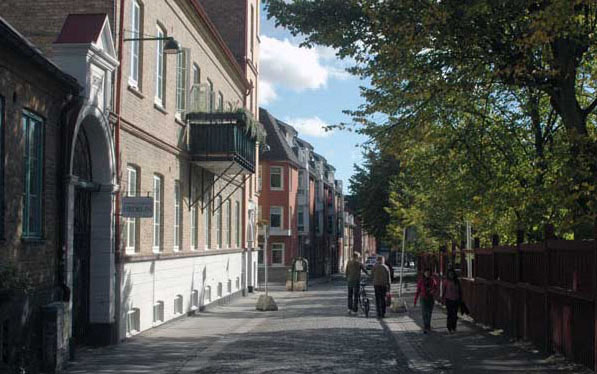 29 October 2007
29 October 2007
| Educational News |
| Important lectures/seminars |
| Conferences and workshops |
| Politics and Business |
| South Asia related Culture |
| New and updated information |
• Anna Lindberg and Lars Eklund to visit Indian universities 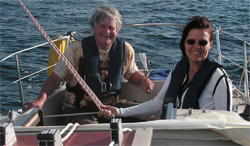 during November
during November
During the period 1–30 November 2007, SASNET’s director Dr. Anna Lindberg and deputy director/-webmaster Lars Eklund will make a new contact journey to South Asia.
This time, they will mainly visit universities and research institutions in Northern and Western/Southwestern India.
The ambition to promote researcher
cooperation and student exchange is the same as it was for the previous three contact journeys to different parts of South Asia that Staffan Lindberg and Lars Eklund successfully carried out in 2002, 2003 and 2005 (see the reports from the previous journeys). The places to visit will be Delhi, Thiruvananthapuram, Kottayam, Kozhikode, Mumbai, Loni, Pune, Bangalore and Mysore. See the programme for the tour (as a pdf-file)
• South Asian Reference
group meeting in New Delhi
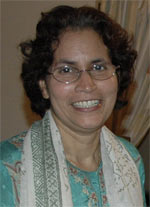 On Saturday 3 November 2007, a seminar meeting
will be organised in New Delhi for SASNET’s South Asian Reference
group, consisting of a number of senior researchers from the
region,
that closely observe SASNET’s activities and give constructive
suggestions to the root node. SASNET’s
new Director Anna Lindberg and the Deputy Director Lars Eklund
will then meet and discuss with Dr. Rita Afsar (photo to the right), Bangladesh Institute
of Development Studies, Dhaka, Bangladesh; Dr.
Tek Nath Dhakal, Campus Chief of Public Administration Campus,
Tribhuvan University, Kathmandu, Nepal; Professor Kumudu Wijewardena,
University of Sri Jayewardenepura (SJP), Colombo, Sri Lanka;
Dr. Dipak Malik, Gandhian Institute of Studies,
Varanasi, India; and Dr. J. Devika, Centre for Development Studies (CDS), Thiruvananthapuram, Kerala, India. The only missing member will be Professor Zulfiqar Bhutta,
Dept. of Paediatrics, Aga Khan University, Karachi, Pakistan. The meeting will be held at the Nordic Centre
in India (NCI) in Nizamuddin, New Delhi. More information about SASNET’s
South Asian Reference group.
On Saturday 3 November 2007, a seminar meeting
will be organised in New Delhi for SASNET’s South Asian Reference
group, consisting of a number of senior researchers from the
region,
that closely observe SASNET’s activities and give constructive
suggestions to the root node. SASNET’s
new Director Anna Lindberg and the Deputy Director Lars Eklund
will then meet and discuss with Dr. Rita Afsar (photo to the right), Bangladesh Institute
of Development Studies, Dhaka, Bangladesh; Dr.
Tek Nath Dhakal, Campus Chief of Public Administration Campus,
Tribhuvan University, Kathmandu, Nepal; Professor Kumudu Wijewardena,
University of Sri Jayewardenepura (SJP), Colombo, Sri Lanka;
Dr. Dipak Malik, Gandhian Institute of Studies,
Varanasi, India; and Dr. J. Devika, Centre for Development Studies (CDS), Thiruvananthapuram, Kerala, India. The only missing member will be Professor Zulfiqar Bhutta,
Dept. of Paediatrics, Aga Khan University, Karachi, Pakistan. The meeting will be held at the Nordic Centre
in India (NCI) in Nizamuddin, New Delhi. More information about SASNET’s
South Asian Reference group.
• Well-attended SASNET seminar with the Pakistani Ambassador to Sweden
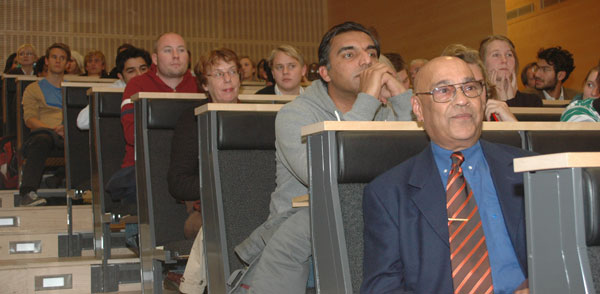 More than 150 people attended the SASNET seminar on ”Global Terrorism: Myth or Reality”, held in Lund on Wednesday 10 October 2007.
The Ambassador of Pakistan to Sweden, H.E. Mr. Shaheen A. Gillani was the key speaker. He talked about the theme for the evening, questioning the use of the concept ”terrorism” only by individuals and groups but excluding the prevalent cases of state terrorism. The seminar was co-organised by the Centre for Middle Eastern Studies and the Association of Foreign Affairs at Lund University.
More than 150 people attended the SASNET seminar on ”Global Terrorism: Myth or Reality”, held in Lund on Wednesday 10 October 2007.
The Ambassador of Pakistan to Sweden, H.E. Mr. Shaheen A. Gillani was the key speaker. He talked about the theme for the evening, questioning the use of the concept ”terrorism” only by individuals and groups but excluding the prevalent cases of state terrorism. The seminar was co-organised by the Centre for Middle Eastern Studies and the Association of Foreign Affairs at Lund University.
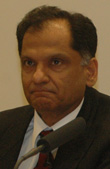 Other speakers at the seminar were
Prof. Bo Huldt from the Swedish National Defence College in Stockholm,
Dr. Maria Bjernevi, former Senior Analyst at the Swedish Security Service (Säpo), and
Iram Asif from Copenhagen University. More information about the seminar.
Other speakers at the seminar were
Prof. Bo Huldt from the Swedish National Defence College in Stockholm,
Dr. Maria Bjernevi, former Senior Analyst at the Swedish Security Service (Säpo), and
Iram Asif from Copenhagen University. More information about the seminar.
A newspaper report about the seminar appeared in the 12 October issue of the weekly web magazine Veckobladet. Read the article, written by Bertil Egerö.
The following day, on Thursday 11 October, the Pakistani Ambassador Shaheen A. Gillani (photo to the right) made a visit to SASNET’s root node office at Scheelevägen. SASNET’s Director Anna Lindberg, and Deputy Director Lars Eklund presented the Swedish South Asian Studies Network. During his visit to Lund University, he also visited the Centre for Middle Eastern Studies, and had lunch with the University Director Marianne Granfelt.
• SASNET presentation to the Swedish Parliament’s Foreign Affairs Committee
On Monday, October 22, the
Swedish Parliament’s Foreign Affairs Committee visited Lund University. The purpose was to introduce
the members to ongoing activities and research at Lund University of relevance for Swedish
politicians with regard to international issues. Three sessions
were held, with the following titles: ”Perspective Africa”, ”Perspective The Middle East”,
and ”Perspective Asia”. SASNET’s Director Anna Lindberg was invited to introduce SASNET and some of its activities, and
she also spoke on the topic ”The New India: A Trade and Research Nation”. Dr.
Sidsel Hansson from the Centre for East and South-East Asian Studies (ACE), and Associate Professor Catarina Kinnvall, Dept. of Political Science, also made a presentation
with the title ”Religion and Security Threats in India and Pakistan”. The
following politicians participated:
Göran Lennmarker (m), Kerstin Lundgren (c), Walburga Habsburg Douglas (m),
Kenneth Forslund (s), and Björn Hamilton (m). See the programme for the day (as a pdf-file)
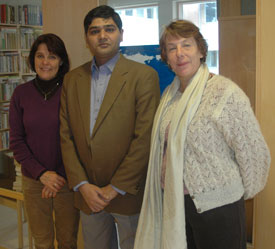 |
| Muhammad Amir Rana during his visit to SASNET, surrounded by SASNET’s Director Anna Lindberg, and Dr. Sidsel Hansson, researcher at the Centre for East and South-East Asian Studies, Lund University. |
• Visit to SASNET by the Director for Pak Institute for Peace Studies
Muhammad Amir Rana, Director of the Pak Institute for Peace Studies (PIPS) in Lahore, Pakistan, visited SASNET’s office in Lund on Thursday 25 October 2007. Mr. Rana, who is a renowned expert on terrorism and regional strategic issues, and in 2004 wrote the book "A to Z of Jihad organizations
in Pakistan", has been invited to Sweden by the Dept. of Political Science at Lund University since the department is currently establishing a collaboration with PIPS. During his stay in Lund, he will also hold a lecture at the Dept. of Political Science on 'Pakistan and the radicalization of Islam and the upcoming election'.
• SASNET contribution to Lund University’s Asia
Library
Through its involvement with the Masters Programme in Asian Studies (including a South Asia track), SASNET has been actively working to open up the Lund University’s Asia
Library to include South Asia related literature (besides its existing collections of literature on East and South-East Asia). Since a couple of years, the course literature for the Masters programme is available in the Asia Library (Asienbiblioteket, at the
ground floor in the same building as the Centre for East and South-East Asian Studies, ACE, but with its entrance from Scheelevägen
15 C). In January 2007, the SASNET board decided to set aside SEK 25 000 to buy and catalogue books on modern South Asian studies for the Asia Library. A number of books from SASNET’s root node office collection (more information) were also donated to the Asia Library.
From October 2007, a list of SASNET’s first contribution of more than 100 volumes is available through the Asia Library web page. Go for the list of South Asia books in Lund University’s Asia
Library (as a pdf-file).
• SASNET co-organises research conference on Nature, Knowledge, Power
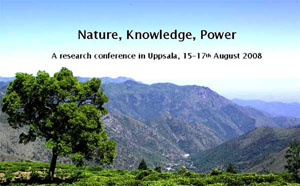 SASNET is co-organising a research conference titled ”Nature, Knowledge, Power”, to be held in Uppsala 15–17 August 2008. The conference hopes to bring together researchers from different academic fields, concerned with questions of environment and society under present and historical conditions. The other conference organisers are the Department for Rural and Urban Development at the Swedish University for Agricultural Sciences (SLU), and Uppsala Centre for Sustainable Development (CSD). The themes for the sessions include: – Energy: renewable and/or unsustainable?; – Competing rights, access, law..; – Community rights and the market ; – Who needs conservation? Nature, people, survival ; – On urban environments; and – Ideologies of environmental change: from imperial modernization to postcolonial social justice?. Deadline for applications to the conference is 31 March 2008. More information.
SASNET is co-organising a research conference titled ”Nature, Knowledge, Power”, to be held in Uppsala 15–17 August 2008. The conference hopes to bring together researchers from different academic fields, concerned with questions of environment and society under present and historical conditions. The other conference organisers are the Department for Rural and Urban Development at the Swedish University for Agricultural Sciences (SLU), and Uppsala Centre for Sustainable Development (CSD). The themes for the sessions include: – Energy: renewable and/or unsustainable?; – Competing rights, access, law..; – Community rights and the market ; – Who needs conservation? Nature, people, survival ; – On urban environments; and – Ideologies of environmental change: from imperial modernization to postcolonial social justice?. Deadline for applications to the conference is 31 March 2008. More information.
• Staffan Lindberg Report from the Asia-Europe Alumni Networks
meeting in Madrid
 Prof. Staffan Lindberg represented SASNET at the Inaugural Meeting of Asia-Europe Alumni Networks
that was held in Madrid, Spain, 30 August – 1 September
2007.
It was organised by the Asia-Europe
Foundation (ASEF) with
the support of the Research Unit on International Security and
Cooperation (UNISCI) of the Universidad Complutense de Madrid and
the already existing ASEF University
Alumni Network (ASEFUAN).
The Madrid meeting was an informal consultation process to
derive ideas, reactions and substantive proposals from specially
invited high-level representatives of existing bi- or international
alumni networks, representing academic exchange programmes with
an Asia-Europe dimension. This brainstorming session was organised
with workshops to facilitate an open and free discussion about
the formation of a platform for co-operation among various Asia-Europe
alumni networks. Read Staffan Lindberg’s Report from the Alumni Conference (as a pdf-file).
Prof. Staffan Lindberg represented SASNET at the Inaugural Meeting of Asia-Europe Alumni Networks
that was held in Madrid, Spain, 30 August – 1 September
2007.
It was organised by the Asia-Europe
Foundation (ASEF) with
the support of the Research Unit on International Security and
Cooperation (UNISCI) of the Universidad Complutense de Madrid and
the already existing ASEF University
Alumni Network (ASEFUAN).
The Madrid meeting was an informal consultation process to
derive ideas, reactions and substantive proposals from specially
invited high-level representatives of existing bi- or international
alumni networks, representing academic exchange programmes with
an Asia-Europe dimension. This brainstorming session was organised
with workshops to facilitate an open and free discussion about
the formation of a platform for co-operation among various Asia-Europe
alumni networks. Read Staffan Lindberg’s Report from the Alumni Conference (as a pdf-file).
• SASNET/UPF Forum on the future for Afghanistan to be held in Lund
The Association of Foreign Affairs at Lund University (UPF) organises an Afghanistan forum on Wednesday 14 November 2007, 19.30. The seminar is titled ”Är Afghanistans sak vår? – ett samtal om vart Afghanistan är på väg, och om den roll Sverige och omvärlden kan spela”. The participants are
Bengt Kristiansson, General Secretary, Swedish Committee for Afghanistan (SCA); Colonel Bengt Sandström, former Chief for the Swedish military forces in northern Afghanistan; and the Islamologist Ahmed Gholam, PhD candidate at the Dept of History of Religions, Lund University. More information.
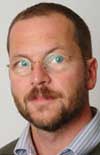 • Democracy in Bangladesh theme for SASNET lecture
• Democracy in Bangladesh theme for SASNET lecture
Professor Arild Engelsen Ruud from the Dept. of Culture Studies and Oriental Languages (IKOS), University of Oslo, holds a SASNET lecture in Lund on Wednesday 12 December 2007, 19.30–21.00. The seminar is jointly organised by SASNET and the Association of Foreign Affairs at Lund University (UPF). Prof. Ruud, who has a PhD in in History, Anthropology, and Development Studies from London School of Economics (LSE), will talk about 'Democracy in a poor country: Bangladesh at the crossroads?'. Venue: Athen, AF-borgen, Sandgatan 10, Lund.
• More information about SASNET and its
activities
See SASNET’s page, http://www.sasnet.lu.se/sasnet.html
• ENCARI Round Table conference in Brussels on ”EU–India: Deepening the Strategic Partnership”
 The European Network for Contemporary Academic Research on India (ENCARI) organises a Round Table & EU-India Think Tank Dialogue conference in Brussels, Belgium, 13–14 November 2007. The theme for the conference, open only to invited participants, will be ”EU–India: Deepening the Strategic Partnership”. ENCARI, formally launched in 2006 (more information), has been assigned a role to offer policy formulation support for the EU Commission's services engaging India and developing EU-India political and economic cooperation. Since May 2006, nine ENCARI Briefing Papers on specific topics have been prepared, covering a broad range of crucial issues in EU–India relations. These policy papers provide the key input for the ENCARI Round Table, that will be convened at the European Commission in Brussels. ENCARI’s member organisations have been invited to participate in the conference, and SASNET will send three Swedish representatives to Brussels (Dr. Sidsel Hansson, Centre for East and South East Asian Studies, Lund University;
Dr. Per Hilding, Department of Economic History, Stockholm University; and PhD Candidate Ferdinando Sardella, Department of Religious Studies and Theology, Göteborg University). Read their extensive conference report from Brussels (as a pdf-file)
The European Network for Contemporary Academic Research on India (ENCARI) organises a Round Table & EU-India Think Tank Dialogue conference in Brussels, Belgium, 13–14 November 2007. The theme for the conference, open only to invited participants, will be ”EU–India: Deepening the Strategic Partnership”. ENCARI, formally launched in 2006 (more information), has been assigned a role to offer policy formulation support for the EU Commission's services engaging India and developing EU-India political and economic cooperation. Since May 2006, nine ENCARI Briefing Papers on specific topics have been prepared, covering a broad range of crucial issues in EU–India relations. These policy papers provide the key input for the ENCARI Round Table, that will be convened at the European Commission in Brussels. ENCARI’s member organisations have been invited to participate in the conference, and SASNET will send three Swedish representatives to Brussels (Dr. Sidsel Hansson, Centre for East and South East Asian Studies, Lund University;
Dr. Per Hilding, Department of Economic History, Stockholm University; and PhD Candidate Ferdinando Sardella, Department of Religious Studies and Theology, Göteborg University). Read their extensive conference report from Brussels (as a pdf-file)
 Mr Dipak Chatterjee (photo to the right), Ambassador of India to the European Union, will hold an opening speech on ”India’s Fast Growth Scenario and the opportunities for EU-India Relations”. Other prominent speakers at the Round Table are Dr Harsha Singh, Deputy Director-General, World Trade Organisation, Geneva, who will talk about ”India’s Trade and Trade Related Reforms: A WTO Perspective”; Dr Lawrence Saez, School of Oriental and African Studies, University of London, who will talk about ”EU-India Cooperation in the field of Civil Nuclear Energy”; Prof Jean-Luc Racine, Ecole des Hautes Etudes en Sciences Sociales, France, who will talk about ”Strategic Issues and the outlook for EU-India political cooperation”; and Dr Marie Lall, Institute of Education and Chatham House, London, who will talk about ”India’s interests in Myanmar – a comparative perspective”.
Mr Dipak Chatterjee (photo to the right), Ambassador of India to the European Union, will hold an opening speech on ”India’s Fast Growth Scenario and the opportunities for EU-India Relations”. Other prominent speakers at the Round Table are Dr Harsha Singh, Deputy Director-General, World Trade Organisation, Geneva, who will talk about ”India’s Trade and Trade Related Reforms: A WTO Perspective”; Dr Lawrence Saez, School of Oriental and African Studies, University of London, who will talk about ”EU-India Cooperation in the field of Civil Nuclear Energy”; Prof Jean-Luc Racine, Ecole des Hautes Etudes en Sciences Sociales, France, who will talk about ”Strategic Issues and the outlook for EU-India political cooperation”; and Dr Marie Lall, Institute of Education and Chatham House, London, who will talk about ”India’s interests in Myanmar – a comparative perspective”.
• Swedish Research Council grants to three South Asia related projects in Humanities and Social Sciences
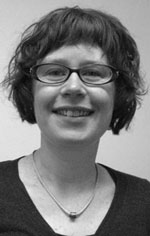 Three
South Asia related projects were given three-years grants for
the period 2008–10 from the Swedish Research Council for
research within the fields of Humanities and Social Sciences
2007. The decisions were taken on 17 October 2007. Dr. Anna-Pya Sjödin (photo), South Asian
Languages and Cultures, Department of Linguistics
and Philology, Uppsala University, was given SEK 3.3 million as a three-year grant for a post-doc project titled ”The little girl who knew her brother would be coming home: cognition and knowledge in Nyaya-Vaisesika”. Dr. Pernille Gooch, Division of
Human Ecology, Lund University, was given SEK 1.4 million as a three-year grant for a project titled ”Participatory Assessment of Sustainable Scenarios for Himalayan Pastoralism”. Prof. Peter Wallensteen, Dept. of Peace and Conflict Research, Uppsala University, was given SEK 2.1 million as a three-year grant for a research project titled ”Communal Violence – Causes and Solutions”. Full
information about the 2007 grants.
Three
South Asia related projects were given three-years grants for
the period 2008–10 from the Swedish Research Council for
research within the fields of Humanities and Social Sciences
2007. The decisions were taken on 17 October 2007. Dr. Anna-Pya Sjödin (photo), South Asian
Languages and Cultures, Department of Linguistics
and Philology, Uppsala University, was given SEK 3.3 million as a three-year grant for a post-doc project titled ”The little girl who knew her brother would be coming home: cognition and knowledge in Nyaya-Vaisesika”. Dr. Pernille Gooch, Division of
Human Ecology, Lund University, was given SEK 1.4 million as a three-year grant for a project titled ”Participatory Assessment of Sustainable Scenarios for Himalayan Pastoralism”. Prof. Peter Wallensteen, Dept. of Peace and Conflict Research, Uppsala University, was given SEK 2.1 million as a three-year grant for a research project titled ”Communal Violence – Causes and Solutions”. Full
information about the 2007 grants.
• Swedish Research Links grants 2007 soon to be announced
The sixth round of the so-called Swedish Research Links (Asian–Swedish
research partnership programme) – grants by Sida and the Swedish
Research Council – will be decided upon on Tuesday 30 October 2007. The decisions will be announced in early November 2007.
• SPIDER support to ICT collaboration projects in Bangladesh and Sri Lanka
 SPIDER, the Swedish Program for Information and Communication
Technology (ICT) in Developing Regions,
was established in 2004. Since then, a number of South Asia related collaboration projects have been given SPIDER funding. For the period 2007–09, SPIDER has given SEK 1.6 million as a grant to the Dept. of Applied Information Technology (2IT) at the Campus IT University in Kista for a project on ”ICT in rural development in Bangladesh”, carried out in collaboration with Grameen Communications; Grameen Phone; Bangabandhu Sheikh Mujib Medical University, all in Bangladesh; and the International Institute of Information Technology (IIIT) in Hyderabad, India.
SPIDER, the Swedish Program for Information and Communication
Technology (ICT) in Developing Regions,
was established in 2004. Since then, a number of South Asia related collaboration projects have been given SPIDER funding. For the period 2007–09, SPIDER has given SEK 1.6 million as a grant to the Dept. of Applied Information Technology (2IT) at the Campus IT University in Kista for a project on ”ICT in rural development in Bangladesh”, carried out in collaboration with Grameen Communications; Grameen Phone; Bangabandhu Sheikh Mujib Medical University, all in Bangladesh; and the International Institute of Information Technology (IIIT) in Hyderabad, India.
Other South Asia related collaboration projects that have been given SPIDER funding for the period 2007–09 are:
– A project titled ”Bangladesh Virtual Classroom sustained”, carried out by the Dept. of Business, Economics, Statistics and Informatics (ESI), Örebro University. The project has been given SEK 1 million by SPIDER.
– A project on ”Agricultural market information for farmers”, also coordinated by ESI, Örebro University. This project, also focusing on Bangladesh, has equally been given SEK 1 million.
– A project on ”Mobile ATMs for Developing Countries”, carried out by the Dept. of Computer and Systems Sciences, Royal Institute of Technology, Stockholm. This project, focusing on Sri Lanka, has been given SEK 800 000 from SPIDER.
More information on SPIDER and its funding programme.
• Anders Nordström new Director-General for Sida
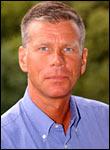 On Thursday 18 October 2007, the Swedish Government appointed Anders Nordström as the new Director-General and head of the Swedish International Development Cooperation Agency, Sida. He is at present Assistant Director-General of the World Health Organisation (WHO) and will take up his new post on 28 January 2008. He has a solid background in international development cooperation and since 2003 has been working at the WHO in Geneva, where between May 2006 and January 2007 he was acting Director-General. Anders Nordström has previously worked for the Global Fund to Fight AIDS, Tuberculosis and Malaria in Geneva, for Sida in Stockholm and Zambia, and for the Red Cross in Cambodia and Iran. Anders has also worked as a medical practitioner. More information.
On Thursday 18 October 2007, the Swedish Government appointed Anders Nordström as the new Director-General and head of the Swedish International Development Cooperation Agency, Sida. He is at present Assistant Director-General of the World Health Organisation (WHO) and will take up his new post on 28 January 2008. He has a solid background in international development cooperation and since 2003 has been working at the WHO in Geneva, where between May 2006 and January 2007 he was acting Director-General. Anders Nordström has previously worked for the Global Fund to Fight AIDS, Tuberculosis and Malaria in Geneva, for Sida in Stockholm and Zambia, and for the Red Cross in Cambodia and Iran. Anders has also worked as a medical practitioner. More information.
• Doctoral dissertation about Social Capital, Health and Socioeconomic Inequalities in Health
Muhammad Kamrul Islam from the Division of Social Epidemiology and Health Economics, Lund University (in Malmö), will defend his doctoral dissertation on ”Essays on Social Capital, Health and Socioeconomic Inequalities in Health. A Health Economic Study”, on Thursday 1 November 2007, at 13.00. Venue: Lilla Aulan, Medical Research Center (MFC), entrance 59, Universitetssjukhuset UMAS in Malmö. Faculty opponent is Professor Terkel Christiansen, Odense, Denmark.
• Afghan Dilemma on Education, Gender and Globalisation theme for Stockholm dissertation
Pia Karlsson and Amir Mansory from the Institute of International Education (IIE) at Stockholm University will defend their joint doctoral dissertation titled ”An Afghan Dilemma: Education, Gender and Globalisation in an Islamic Context”, on Friday 2 November 2007, at 13.00, The thesis deals with the socialisation process of
rural village girl students in Islamic education and 'Modern' education
from a holistic and ecological development perspective. Faculty opponent will be Prof. David Stephens from the School of Education, University of Brighton, UK. Venue: Wallenbergsalen, Juristernas Hus, Frescativägen 18, Stockholm. Read the abstract of the thesis.
• Dissertation about Ritual Uses of Texts among the Sikhs in Varanasi
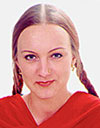 Kristina Myrvold, Division of Indic Religions, Department of History and Anthropology
of Religion, Lund University, will defend her doctoral dissertation ”Inside the Guru’s Gate. The Ritual Uses of Texts among the Sikhs in Varanasi” on Thursday 20 December 2007, at 10.15. The thesis deals with Sikh rituals in Varanasi, where Kristina has conducted fieldwork
for several years. Her study focuses on religious attitudes towards the
Sikh scripture and the ritual use of texts. Venue: Spoletorps hörsal, Spolegatan 1R, Lund. More information about Kristina Myrvold’s research.
Kristina Myrvold, Division of Indic Religions, Department of History and Anthropology
of Religion, Lund University, will defend her doctoral dissertation ”Inside the Guru’s Gate. The Ritual Uses of Texts among the Sikhs in Varanasi” on Thursday 20 December 2007, at 10.15. The thesis deals with Sikh rituals in Varanasi, where Kristina has conducted fieldwork
for several years. Her study focuses on religious attitudes towards the
Sikh scripture and the ritual use of texts. Venue: Spoletorps hörsal, Spolegatan 1R, Lund. More information about Kristina Myrvold’s research.
• Nordic NIAS Council (NNC) introduces AsiaPortal web site
On 12 October 2007, the Nordic NIAS Council (NNC), an network comprising of 23 Nordic universities and research institutions working on Asia, went public with its new web site, called AsiaPortal. The portal, based at the Nordic Institute for Asian Studies (NIAS) in Copenhagen, gives access to a long range of journals, news services and information sources. At the same time it is a platform for internal cooperation between the involved institutions and their researchers. Finally, the portal functions externally by promoting the institutions’ research and resources so that people can access the desired knowledge and competences. Go for AsiaPortal.
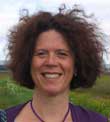 • Ute Hüsken new
Professor of Sanskrit at Oslo University
• Ute Hüsken new
Professor of Sanskrit at Oslo University
On 1 October 2007, Dr. Ute Hüsken took up the position as
Professor of Sanskrit at the
Department of Culture Studies and Oriental Languages (IKOS),
University of Oslo. Prof. Hüsken wrote her PhD thesis
at the University of Göttingen, Germany, in 1996 on the disciplinary code for Theravada Buddhist nuns. Since 2003 she has held a research
position in the interdisciplinary Collaborative Research Centre ”Dynamics
of Ritual” at Heidelberg University, heading a project on ”Initiation, priestly ordination, temple festivals and ritual traditions in the south Indian temple city of Kancipuram”. More information about this project (that is supposed to be concluded in late 2008).
• SYDASIEN magazine looking for new Editor-in-chief
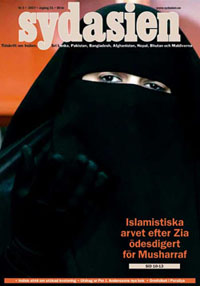 The Swedish language magazine SYDASIEN (the current issue, 3/2007, is shown to the right) has been published since 1977. With popularly written articles by Scandinavian researchers and journalists on politics, history, literature and culture in the eight countries that form South Asia (Afghanistan, Bangladesh, Bhutan, India, Maldives, Nepal, Pakistan and Sri Lanka) SYDASIEN has played an important role over the years. For the last 25 years, SASNET’s deputy director Lars Eklund has been the editor of the magazine, but from 2008 he will leave this position (read his farewell article, as a pdf-file in Swedish). Anyone interested in taking over the responsibility, may now contact SYDASIEN to discuss different possibilities for the future management of the magazine. More information about SYDASIEN.
The Swedish language magazine SYDASIEN (the current issue, 3/2007, is shown to the right) has been published since 1977. With popularly written articles by Scandinavian researchers and journalists on politics, history, literature and culture in the eight countries that form South Asia (Afghanistan, Bangladesh, Bhutan, India, Maldives, Nepal, Pakistan and Sri Lanka) SYDASIEN has played an important role over the years. For the last 25 years, SASNET’s deputy director Lars Eklund has been the editor of the magazine, but from 2008 he will leave this position (read his farewell article, as a pdf-file in Swedish). Anyone interested in taking over the responsibility, may now contact SYDASIEN to discuss different possibilities for the future management of the magazine. More information about SYDASIEN.
• Nobel Peace Prize 2007 to the Intergovernmental Panel on Climate Change
The Norwegian Nobel Committee has decided that the Nobel Peace Prize for 2007 is to be shared, in two equal parts, between the Intergovernmental Panel on Climate Change (IPCC) and Albert Arnold (Al) Gore Jr. for their efforts to build up and disseminate greater knowledge about man-made climate change, and to lay the foundations for the measures that are needed to counteract such change. The IPCC was created almost 20 years ago to response to growing concern about the risk of anthropogenic climate change. The General Assembly of the United Nations asked the two UN bodies most engaged in the issue, the World Meteorological Organization and the United Nations Environment Programme, to set up this Panel to provide balanced, objective policy advice. Mr. Rajendra Pachauri of India was elected Chairman of the IPCC in 2002. During his Chairmanship, he has emphasized the world-wide coverage and interdisciplinary nature of the IPCC work.
• Agriculture for Development theme for the World Development Report (WDR) 2008
 The theme of the World Bank's World Development Report (WDR) 2008 is ”Agriculture for Development”. A reconsideration of agriculture’s role in development has been long overdue. Developing country agriculture is caught up in the far-reaching changes brought by globalization, the advent of highly sophisticated and integrated supply chains, innovation in information technology and biosciences, and broad institutional changes—especially in the role of the state and in modes of governance and organization. The final report was published on Friday 19 October 2007. More information.
The theme of the World Bank's World Development Report (WDR) 2008 is ”Agriculture for Development”. A reconsideration of agriculture’s role in development has been long overdue. Developing country agriculture is caught up in the far-reaching changes brought by globalization, the advent of highly sophisticated and integrated supply chains, innovation in information technology and biosciences, and broad institutional changes—especially in the role of the state and in modes of governance and organization. The final report was published on Friday 19 October 2007. More information.
• Human Development Report 2007/2008 to be published in late November
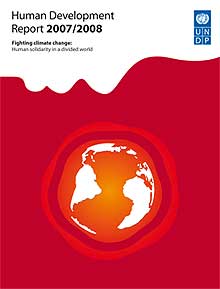 The Human Development Report 2007/2008 will focus on ”Flighting climate change: Human solidarity in a divided world.
Rising to the challenge”. The new Human Development Report will explain why we have less than a decade to change course and start living within our global carbon budget. It explains how climate change will create long-run low human development traps, pushing vulnerable people into a downward spiral of deprivation. Because climate change is a global problem with global causes and effects, it demands a global response with countries acting on the basis of their historic responsibility and capabilities. The Human Development Report 2007 will be launched in late November 2007. More information.
The Human Development Report 2007/2008 will focus on ”Flighting climate change: Human solidarity in a divided world.
Rising to the challenge”. The new Human Development Report will explain why we have less than a decade to change course and start living within our global carbon budget. It explains how climate change will create long-run low human development traps, pushing vulnerable people into a downward spiral of deprivation. Because climate change is a global problem with global causes and effects, it demands a global response with countries acting on the basis of their historic responsibility and capabilities. The Human Development Report 2007 will be launched in late November 2007. More information.
• Stanford University announces position in Sociocultural Anthropology
The Department of Anthropology at Stanford University invites applications for a tenured or tenure-track faculty appointment in Sociocultural Anthropology. The appointment is open as to rank. Applicants with a broad range of interests will be considered, but preference will be given to applicants with strength in the geographical area of South Asia. The term of appointment will begin on September 1, 2008. Stanford University is an affirmative action/equal opportunity employer, applications from women and minorities are actively invited. Deadline for applications is December 7, 2007, but candidates are strongly urged to apply before November 9, 2007, so they can be screened for possible interviews at the AAA Meetings in Washington, DC, November 28 – December 2, 2007. Send vita, letter describing qualifications and interests, and one example of written work to Professor James Ferguson, Chair, Search Committee, Department of Anthropology, Building 50, Main Quad, Stanford University, Stanford, CA 94305-2034. Assistant Professor candidates should also submit the names of three referees.
• Research Assistant Professor position in China-India Comparative Studies
Applications are invited for a new Research Assistant Professor (RAP) in China-India Comparative Studies in the Centre of Asian Studies (CAS) of the University of Hong Kong. The appointment will be made for an initial period of 3 years, with the possibility of renewal for a further three years depending on performance and funding. This is a research-active position. Applicants must be able to demonstrate that they have an active research agenda, with a proven publication record in at least one of the research areas of CAS. These areas include: studies of Asian regionalism, non-traditional security analysis, population policy and diaspora studies as well as labour and migration studies. Review of applications will start from January 15, 2008 and continue until the post is filled. Further particulars and application forms (272/302 amended) can be obtained at https://www.hku.hk/apptunit/; or e-mail (senrappt@hkucc.hku.hk).
• More information about South Asia related
research at Swedish and Nordic universities
See SASNET’s page, http://www.sasnet.lu.se/research.html
• Information about South Asia related
education at Swedish and Nordic universities
See SASNET’s page, http://www.sasnet.lu.se/education.html
Important lectures and seminars in Scandinavia
• Oslo seminar on the Afghan Quagmire
A seminar on ”The Afghan Quagmire: Whose Peace, Which Peace and How to 'Build' it” will be held on Oslo on Thursday 1 November 2007, 13.00–16.00. The seminar is organised by the International Peace Research Institute (PRIO), being part of PRIO’ ongoing research project “Arms against a sea of troubles”, reflecting over human rights and International jurisdiction in the context of military interventions. Venue: PRIO, Hausmanns gate 7, Oslo.
• Zahid Hussain and Husain Haqqani key speakers at Pakistan seminar in Copenhagen
An international seminar on the political situation in Pakistan will be held in Copenhagen 2 November 2007, 12.30-14.30. The seminar, titled ”Pakistan: Between dictatorship and democracy – balancing the internal and external challenges”, is organized by the Royal Danish Defence College, and the Danish Institute for International Studies (DIIS). The key speakers are Zahid Hussain, Pakistan correspondent for Times of London, who will talk about ”Confronting the Taleban; implications for Afghanistan and Pakistan”; and Husain Haqqani, Director, Center for International Relations, Boston University, who will talk about ”Pakistan: Internal and external alliances”. (Later the same day, they will also participate in a film seminar on Pakistan, see below). The noon seminar will be held at Svanemøllen Barracks in Copenhagen. Registration by e-mail to Carsten Grønholdt no later than 31 October 2007. More information.
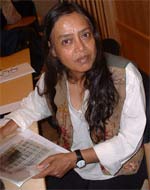 •
Saraswati Raju lectures on empowerment projects in Uppsala
•
Saraswati Raju lectures on empowerment projects in Uppsala
Prof. Saraswati Raju from Jawaharlal Nehru University (JNU) in New Delhi, India, will lecture in Uppsala on
Thursday 8 November 2007, 14.15–16.00. Prof. Raju, who is Professor in Social Geography at JNU’s Center for the Study of Regional Development, will talk about ”Measuring the Impact of Empowerment Projects:
Gender, Space and Place”, argueing that that empowering outcomes of any initiatives aimed at women also differ depending upon the locational contexts in which they are being implemented, since patriarchy does not enact homogeneously and is intercepted by spatial contexts.
The seminar is organised by the Seminar for Development Studies and the Cemus Research Forum (Cefo) at the Uppsala Center for Sustainable Development, in collaboration with GADNET (the Swedish Gender and Development Network). Venue: Room 2, Main University Hall (Universitetsbyggnaden), Övre Slottsgatan/St.Olofsgatan, Uppsala. The seminar is open to all interested.
• Hans Niklasson lectures on Bangladeshi history in Stockholm
Mr. Hans Niklasson, former Minister at the South Asia Desk within the Swedish Ministry of Foreign Affairs, lectures at Stockholm University about ”Bangladesh – ett land med turbulent historia och osäker framtid” on Wednesday 9 November 2007, 15–17. It is one of the regular Wednesday lectures arranged by the Centre for Pacific Asian Studies, CPAS, at Stockholm University. Hans Niklasson, who just retired from his position, was till recently the chargé d’affaires at the Swedish Embassy in Islamabad, Pakistan. Venue for the lecture: B-salen, Dept. for Oriental Languages, Kräftriket 4 (earlier Roslagsvägen 101), Stockholm.
• Uppsala lecture with Mahesh Rangarajan from
Delhi University
Prof. Mahesh Rangarajan from
Delhi University, India, lectures at Uppsala University on Thursday 15 November 2007, 13.15–15.00. He will talk about ”Rethinking colonial impacts: the 19th century
in India's ecological history”. The lecture, organised by the Dept. of History, is part of a seminar series organised by the South Asia Seminar at Uppsala University. Venue: Room 1-0060, English Park Campus, Uppsala.
Three days earlier, on Monday 12 November 2007, Prof. Rangarajan, specialised in environmental history, will also give a lecture at the Dept. of Economics, Uppsala University. Venue: K 412. Ekonomikum, Uppsala Universitet, Kyrkogårdsgatan 10. More information.
• Copenhagen lecture about Post-Liberalization State in India
Dr. John Harriss lectures on ”Empowerment and the Governmentality of the Post-Liberalization State in India: Civil Society, Politics and Urban Governance” in Copenhagen on Wednesday 5 December 2007, 14.00-16.00. The lecture is orgaanised by the Danish Institute for International Studies (DIIS). Dr. Harriss will talk about the neo-liberal governance agenda now influential in India, and how it involves a package including decentralisation, community involvement and participation, which are supposed to ‘empower’ especially poorer people. Venue: DIIS, Main Auditorium, Strandgade 71, ground floor, 1401 Copenhagen K, Denmark. More information.
• Deconstruction of the British Empire theme for Uppsala lecture
Prof. Christopher Bayly from
Cambridge University, UK, lectures at Uppsala University on Thursday 6 December 2007, 13.15–16.00. He will talk about ”Deconstructing the British Empire”. Prof. Bayly is a leading scholar on British imperial and Indian history, and the author of "The Birth of the Modern World. Global Connections and Comparisons 1780-1914" and "Forgotten Armies. Britain’s Asian Empire and the War with Japan and Forgotten Wars” The lecture is part of a seminar series organised by the South Asia Seminar at Uppsala University. Venue: Room 1-0062, English Park Campus, Uppsala.
• Richard Eaton lectures in Oslo
Professor Richard Eaton from University of Arizona, USA, will lecture on ”Islam in India, 622-2007: A Historical Framework" in Oslo on Monday 10 December 2007, 14.15–16.00. It is the Annual Lecture organised by the Norwegian Asia Network (Asianettverket. Prof. Eaton explores how historians talk about Islam in India and why this has become such a controversial topic today – especially, why Islam is understood as a foreign "intrusion" in South Asia. He also discusses the sorts of Islamic traditions that have stabilized the Islamic religion across time and space in India, and also account for the different regional varieties of Indo-Islamic culture. Venue: Auditorium 2, Georg Sverdrups hus, Blindern, University of Oslo. More information.
• 11th International Conference on Sri Lanka Studies in Portsmouth
The 11th International Conference on Sri Lanka Studies (ICSLS) will be held on 1–3 November 2007 at the University of Portsmouth, UK. The Conference theme will be "Social Realities and Natural Environment, in Sri Lanka: Insiders' and Outsiders Perspectives". This theme is expected to focus on diverse perspectives on Sri Lankan social realities. The conference will also expand its coverage to discuss interface of social and natural environments within the framework of environmental sustainability.
• CROP workshop on
Adolescent Poverty in Bergen
The Comparative
Research Programme on Poverty, CROP organizes a workshop on
”Adolescent Poverty: Institutional Relations between Education,
Poverty and Work” in Bergen, Norway, 5–7 November 2007.
The workshop will be held in connection to the Norwegian Association
for Development Research (NFU) Conference 2007, and it
aims at exploring the linkages between the two most important institutions
for human development; the world of work and the world of education.
Papers exploring institutional relations between
education, work and poverty in order to give young persons a stable
and respectable job with room for creativity and social mobility
are invited. More information
about the workshop.
• 3rd International Conference on Gross National Happiness in Bangkok
 The 3rd International Conference on Gross National Happiness
will be held in Bangkok, Thailand, 22–28 November 2007.
The theme for the conference, co-organized by the Sathirakoses
Nagapradipa Foundation and the Center
for Bhutan Studies in Thimphu,
will be ”Towards Global Transformation – World
Views make a Difference”.
The concept of Gross National Happiness
(GNH), originated in Bhutan, challenges development models dominated
by GDP (Gross Domestic Product) and un-sustainable economic growth.
The Bangkok conference offers
a creative platform for exchanges, networking and policy development
towards transformation at individual, local, national and international
levels. It will be held in partnership with
a network of Thai and South East Asian NGO’s
and youth groups; and the Ministry of Social Development & Human
Security, and ‘Well-being
Index Network’, Government of Thailand. Invited speakers include
Vandana Shiva from India, and Lyonpo Jigmi Thinley, President of
the Center for Bhutan Studies (CBS) and former Prime Minister of
Bhutan. Ringu Tulku Rinpoche, Professor in Tibetan Buddhism at Sikkim will deliver an introductory lecture on 'World Views Make a Difference' at the main auditorium, Chulalongkorn University, Bangkok, 27th November 2007. More information.
The 3rd International Conference on Gross National Happiness
will be held in Bangkok, Thailand, 22–28 November 2007.
The theme for the conference, co-organized by the Sathirakoses
Nagapradipa Foundation and the Center
for Bhutan Studies in Thimphu,
will be ”Towards Global Transformation – World
Views make a Difference”.
The concept of Gross National Happiness
(GNH), originated in Bhutan, challenges development models dominated
by GDP (Gross Domestic Product) and un-sustainable economic growth.
The Bangkok conference offers
a creative platform for exchanges, networking and policy development
towards transformation at individual, local, national and international
levels. It will be held in partnership with
a network of Thai and South East Asian NGO’s
and youth groups; and the Ministry of Social Development & Human
Security, and ‘Well-being
Index Network’, Government of Thailand. Invited speakers include
Vandana Shiva from India, and Lyonpo Jigmi Thinley, President of
the Center for Bhutan Studies (CBS) and former Prime Minister of
Bhutan. Ringu Tulku Rinpoche, Professor in Tibetan Buddhism at Sikkim will deliver an introductory lecture on 'World Views Make a Difference' at the main auditorium, Chulalongkorn University, Bangkok, 27th November 2007. More information.
• Tenth Sustainable Development Conference in Islamabad
The Sustainable Development Policy Institute (SDPI) in Islamabad, Pakistan, is holding its Tenth Sustainable Development Conference 10–12 December 2007. The conference is titled ”Sustainable Solutions: A Spotlight on South Asian Research”, and will bring together some 40 scholars from South Asia as well as from Europe and the USA. Some of the prominent personalities invited to present keynote lectures include Mr. Shoaib Sultan Khan, Chairman, National Rural Support Program (NRSP), Islamabad; Mr. Syed Babar Ali, Vice President Emeritus, World Wide Fund (WWF), Lahore; and, Dr. Vandana Shiva, Physicist, Ecological Campaigner, Women's Rights Activist and Writer, New Delhi, India.
Besides the keynote lectures, another 14 panels are being organized under the sub-themes of globalization; gender; environment and disaster management; health; and, history. Venue: Best Western Hotel, Islamabad. More information.
• Third International Conference on Fermented Foods in Anand
The Third International Conference on Fermented Foods will be held in Anand, Gujarat, India, 14–15 December 2007. It will be organised by the Dept. of Dairy Microbiology at Anand Agricultural University; in collaboration with the Dept. of Applied Nutrition and Food Chemistry, Lund University, Sweden, UNESCO Institute
of Trace Elements in Lyon, France; and the National Dairy Development Board in Anand, on behalf of the Swedish South Asian Network on Fermented Foods (SASNET–Fermented Foods), that was established with SASNET support in 2002. Last date for submissions of abstracts is 15 November 2007. More information (as a pdf-file)
• Pakistan in the Current Global (Dis)order theme for third LUMS conference
The third LUMS (Lahore University of Management Studies) Social Sciences Conference will be held in Lahore, Pakistan, 14–16 December 2007. The theme for the conference will be ”Pakistan in the Current Global (Dis)order: Perspectives from the Social Sciences”.
This conference is an attempt to re-address some of the weaknesses in the current status of knowledge and discourse on Pakistan by going beyond intelligence and media concerns and exploring a broad range of themes related to globalization and transnationalism, and also to the national civil society.
For further information please contact Marta Bolognani and Laila Bushra at lums.conf.07@gmail.com.
• Pune conference on Biotechnology for Sustainable Development
An International conference on ”Biotechnology for Sustainable Development”, will be held 7–9 January 2008 in Pune, India. The conference, named BSD – 2008, is organised by the Chemical Engineering and Process Development Division at the
National Chemical Laboratory (NCL) in Pune, in collaboration with the Dept. of Biotechnology, Lund University, Sweden. It is supported by the Swedish Foundation for Strategic Environmental Research (Mistra) and the Indian Council of Scientific and Industrial Research (CSIR). Mr. Sanjay Nene from NCL convenes the conference, that will highlight the latest developments areas such as • Biotechnology for production of green chemicals; •
Biorefinery – Use of plantation crops for production of Chemicals; •
Bioremediation of solid, gaseous and liquid wastes; and •
Waste water treatment and recycle using clean technologies. Abstracts should be submitted before 15 November 2007.
 • Delhi conference on Rethinking Religion in India
• Delhi conference on Rethinking Religion in India
An International conference on ”Rethinking Religion in India” will be held
in Delhi, India, 21–24 January 2008. Rethinking Religion in India forms a five year international conference cluster. A novel conference format with three distinct modules will allow for in-depth discussions. The first conference year (2008) will have a Platform, addressing the question ‘Are there native religions in India’; a Roundtable, taking up the issue of ‘Colonialism and Hinduism’ and three Parallel Paper sessions, addressing ‘Evolutionary explanations of religion’, ‘Indians are Aryans, so what?’ and ‘The caste system and Indian religion’. The five year international conference cluster aims at developing an alternative theoretical framework to understand the Indian religions and traditions. It is organized by Research Centre Vergelijkende Cultuurwetenschap at Ghent University in Belgium); in collaboration with the Centre for the Study of Local Cultures at Kuvempu University in Shankaraghatta, Shimoga Dist. India; and the Karnataka Academy of Social Sciences and Humanities (KASSH). Conference venue: Indira Gandhi National Centre for the Arts (IGNCA), New Delhi. More information
• 11th Asian Congress of Agricultural Medicine
and Rural Health to be held in Aurangabad
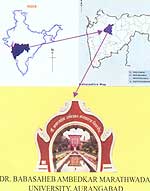 The 11th Asian Congress of Agricultural Medicine
and Rural Health will be held in Aurangabad, India, 22–24
February 2008.
The theme for the 2008 conference will be ”Integrated
Approach For Achieving Millennium Development Goals in Asia”,
and it is being organised by the Association of Agricultural Medicine
and Rural Health in India, the Pravara
Medical Trust, and Pravara Rural University, all based in Loni,
Ahmednagar District in the State of Maharashtra (in collaboration
with the International Association
of Agricultural Medicine and Rural Health, IAAMRH). Besides addressing key issues
related to the theme of the conference, the aim is to promote dialogue
amongst rural health workers, government, NGOs, UN agencies, national
international funding agencies and other stakeholders for finding
solutions on health issues. The conference will also highlight
and foster opportunities for innovative, comprehensive, participatory
rural health models that can be replicated. Venue: Dr. Babasaheb
Ambedkar Marathwada University, Aurangabad. More
information.
The 11th Asian Congress of Agricultural Medicine
and Rural Health will be held in Aurangabad, India, 22–24
February 2008.
The theme for the 2008 conference will be ”Integrated
Approach For Achieving Millennium Development Goals in Asia”,
and it is being organised by the Association of Agricultural Medicine
and Rural Health in India, the Pravara
Medical Trust, and Pravara Rural University, all based in Loni,
Ahmednagar District in the State of Maharashtra (in collaboration
with the International Association
of Agricultural Medicine and Rural Health, IAAMRH). Besides addressing key issues
related to the theme of the conference, the aim is to promote dialogue
amongst rural health workers, government, NGOs, UN agencies, national
international funding agencies and other stakeholders for finding
solutions on health issues. The conference will also highlight
and foster opportunities for innovative, comprehensive, participatory
rural health models that can be replicated. Venue: Dr. Babasaheb
Ambedkar Marathwada University, Aurangabad. More
information.
• New Delhi conference on changing marriage traditions in South Asia
An International conference on ”Marriage in Globalizing Contexts: Exploring Change and Continuity in South Asia” will be held in New Delhi, India in March 2008 (exact dates to be finalised!). It is organised by Dr. Ravinder Kaur, Associate Professor, Department of Humanities and Social Sciences, Indian Institute of Technology, Hauz Khas, New Delhi 110016, e-mail: and Dr. Shalini Grover, Sir Ratan Tata Post Doctoral Fellow, Institute of Economic Growth (IEG), University of Delhi. Papers are invited on marriage and family research focusing on the countries of Afghanistan, Bangladesh, Bhutan, India, Maldives, Nepal, Pakistan and Sri Lanka. Individual contributions should combine conceptual thinking with ethnographic content (i.e. field-work, participant observation and interviews) and be based on the following themes: • Conceptual understandings of marriage; • Demographic Imbalances, Economic Shifts and Marriage Markets; • Shifting ideas of love, intimacy and marital practices; • Divorce and re-marriage; • Women’s paid work, labour force participation and marriage; or • Socio-legal advancements, feminist interventions and their impact on marriage/domestic life. The goal is to consolidate an edited volume that can lend differing perspectives to marriage in South Asia. Deadline for submission of final papers will be in December 2007.
• 20th International Association of Historians of Asia (IAHA) conference to be held in Delhi
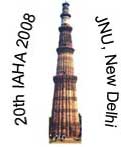 The International Association of Historians of Asia (IAHA) holds its 20th biannual conference at Jawaharlal Nehru University(JNU) in New Delhi, 8–11 December 2008. Through the years, the IAHA has proven to be the cutting edge of historical scholarship in Asia. In more recent conferences, papers have focused on such timely and relevant topics as migration, technology, globalization, inter-religious dialogue, and new historical paradigms. Participants have ranged from the established experts in their fields to up and coming young scholars. Participants have included historians as well as scholars from other disciplines. The 2008 conference is convened by Professor Deepak Kumar at the
Zakir Husain Centre for Educational Studies,
School of Social Sciences, JNU. Abstracts should be submitted before 10 March 2008.
The International Association of Historians of Asia (IAHA) holds its 20th biannual conference at Jawaharlal Nehru University(JNU) in New Delhi, 8–11 December 2008. Through the years, the IAHA has proven to be the cutting edge of historical scholarship in Asia. In more recent conferences, papers have focused on such timely and relevant topics as migration, technology, globalization, inter-religious dialogue, and new historical paradigms. Participants have ranged from the established experts in their fields to up and coming young scholars. Participants have included historians as well as scholars from other disciplines. The 2008 conference is convened by Professor Deepak Kumar at the
Zakir Husain Centre for Educational Studies,
School of Social Sciences, JNU. Abstracts should be submitted before 10 March 2008.
• Other conferences connected to South Asian
studies arranged all over the World
See SASNET’s page, http://www.sasnet.lu.se/conferences.html#conf
Business and Politics
• Bangladeshi collaboration for Swedish network for entrepreneurs from ethnic minorities
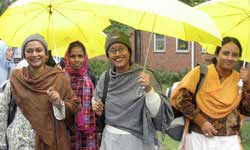 A network for entrepreneurs from ethnic minorities exists in Katrineholm, Flen och Vingåker since 2002. It is named NEEM, which is also a name of a very special South Asian tree, said to be "tree for solving global problems" and "reliever of all diseases". The organization was started by women from ethnic minorities who participated in a development program Equal/Diversity in Entrepreneurship. More information about NEEM.
NEEM has established collaboration with the Bangladeshi NGO Sabalamby Unnayan Samity (SUS), based in Netrakona. In May 2007, a delegation of women from SUS visited Sweden (photo to the right)), as a first step in a new exchange programme.
A network for entrepreneurs from ethnic minorities exists in Katrineholm, Flen och Vingåker since 2002. It is named NEEM, which is also a name of a very special South Asian tree, said to be "tree for solving global problems" and "reliever of all diseases". The organization was started by women from ethnic minorities who participated in a development program Equal/Diversity in Entrepreneurship. More information about NEEM.
NEEM has established collaboration with the Bangladeshi NGO Sabalamby Unnayan Samity (SUS), based in Netrakona. In May 2007, a delegation of women from SUS visited Sweden (photo to the right)), as a first step in a new exchange programme.
• Information about South Asia related
business and politics in Sweden
See SASNET’s page, http://www.sasnet.lu.se/polbuss.html
South Asia related culture in Scandinavia
• South Asian films at CPH:DOX festival in Copenhagen
 Three South Asian documentary films will be screened at the 2007 Copenhagen International Documentary Film Festival, CPH:DOX, held in the first half of November 2007. CPH:DOX is the largest of its kind in Scandinavia, each year the festival fills the Copenhagen cinemas with a selection of more than 130 documentary films from around the world. During the ten festival days, CPH:DOX also presents five whole days of professional seminars and provides an international forum and meeting place with the newly founded DOX:MARKET.
In partnership with Amnesty International Denmark, an Amnesty Award has also been introduced. Ten international films focusing on human rights have been selected to compete for the 2007 Amnesty Award (with a cash prize of Euro 5.000). One of the films is ”India Untouched – Stories of a People Apart”, produced by the Indian director Stalin K (more information). It will be shown on Cinemateket on 9th Nov. and 14th Nov.
Three South Asian documentary films will be screened at the 2007 Copenhagen International Documentary Film Festival, CPH:DOX, held in the first half of November 2007. CPH:DOX is the largest of its kind in Scandinavia, each year the festival fills the Copenhagen cinemas with a selection of more than 130 documentary films from around the world. During the ten festival days, CPH:DOX also presents five whole days of professional seminars and provides an international forum and meeting place with the newly founded DOX:MARKET.
In partnership with Amnesty International Denmark, an Amnesty Award has also been introduced. Ten international films focusing on human rights have been selected to compete for the 2007 Amnesty Award (with a cash prize of Euro 5.000). One of the films is ”India Untouched – Stories of a People Apart”, produced by the Indian director Stalin K (more information). It will be shown on Cinemateket on 9th Nov. and 14th Nov.
 Another film competing for the Amnesty Award is the ”The Red Mosque”, a film made by Farah Durrani, former executive producer at BBC (photo from the film). This film will be screened in connection with a seminar titled ”Pakistan from the inside”, with the journalist Zahid Hussain, working for the British newspaper The Times (and also being the author of the book 'Frontline Pakistan'); and
Hussain Haqqani, Director of the Center for International Relations, Boston University, USA. The seminar, prepared by the Danish journalist Jeppe Matzen, will be held on Friday 2 November 2007, at 16.30. Venue: Grand Teatret, Mikkel Bryggers Gade 8, Copenhagen. More information about the Pakistan seminar.
Another film competing for the Amnesty Award is the ”The Red Mosque”, a film made by Farah Durrani, former executive producer at BBC (photo from the film). This film will be screened in connection with a seminar titled ”Pakistan from the inside”, with the journalist Zahid Hussain, working for the British newspaper The Times (and also being the author of the book 'Frontline Pakistan'); and
Hussain Haqqani, Director of the Center for International Relations, Boston University, USA. The seminar, prepared by the Danish journalist Jeppe Matzen, will be held on Friday 2 November 2007, at 16.30. Venue: Grand Teatret, Mikkel Bryggers Gade 8, Copenhagen. More information about the Pakistan seminar.
The third South Asian film to be screened at the 2007 CPH:DOX festival is ”The Lightning Testimonies”, a film produced by the Indian artist Amar Kanwar (more information). The film was shown as an art installation at the Documenta 12 exhibition in Kassel earlier this year. It will be screened on Saturday 10th Nov. at
Posthus Teatret, Rådhusstræde 1; and on Thursday 15th Nov. at
Gloria Biograf, Rådhuspladsen.
• Sinhalese film to be screened at cinema in Lund
A Sri Lankan film titled ”Uppalavanna”, directed by Sunil Ariyaratne, will be screened at the Kino cinema in Lund on Saturday 8 December 2007, at 11.00 AM. The story is set in the era of terror in the 1980s, when young rebels in Sri lanka harassed and killed not only people whom they did not like, but also their own comrades whenever the leadership felt they were straying. It tells the story about the young woman Upuli, who is born to an aristocratic physician and a respectable mother. She falls in love with a low caste dancing teacher. She leaves her parents and gets married, but her happiness does not last long. Bearing up her troubles the determined Upuli seek solace in the order of the monkhood, taking the name Uppalavanna. When she confronts a severely wounded rebel, she realises she has to make a hard decision – whether to treat him and look after him or abandon him. The screening of the film in Lund is a private initiative from indivuals belonging to the Sri Lankan community in southern Sweden and Denmark. More information about the film.
• More information about South Asia related culture
in Sweden and Scandinavia
See SASNET’s page, http://www.sasnet.lu.se/culture.html
New and updated items on SASNET web site
• Swedish departments where research on
South Asia is going on:
Constantly added to the list of research environments at Swedish
universities, presented by SASNET. The full list now includes 215 departments,
with detailed descriptions of the South Asia related research and education
taking place! Go to http://www.sasnet.lu.se/environment.html
ƒ Dept. of Business, Economics, Statistics and Informatics, Örebro University
• Useful travelling information
Look at http://www.sasnet.lu.se/travelling.html.
Updated travel advises from the The British Foreign & Commonwealth
Office about safety aspects on travelling to the countries of
South Asia.
Best regards,
Anna Lindberg Lars Eklund
SASNET/ Swedish South Asian Studies Network
SASNET is a national network
for research, education, and information about South Asia, based at Lund
University. The aim is to encourage and promote an open and dynamic networking
process, in which Swedish researchers co-operate with researchers in South
Asia and globally.
The network is open to all sciences. Priority is given to co-operation
between disciplines and across faculties, as well as institutions in the
Nordic countries and in South Asia. The basic idea is that South Asian
studies will be most fruitfully pursued in co-operation between researchers,
working in different institutions with a solid base in their mother disciplines.
The network is financed by Sida (Swedish
International Development Cooperation Agency) and by Lund
University.
Postal address: SASNET – Swedish South Asian Studies Network,
Scheelevägen 15 D, SE-223 70 Lund, Sweden
Visiting address: Ideon Research Park, House Alpha 1 (first floor,
room no. 2040 & 2041), in the premises of the Centre for East and South
East Asian Studies at Lund University (ACE).
Phones: + 46 46 222 73 40 and +46 46 222 36 06
Fax: + 46 46 222 30 41
E-mail: sasnet@sasnet.lu.se
Web site:
http://www.sasnet.lu.se
Staff: Anna
Lindberg, director/coordinator & Lars
Eklund, webmaster/deputy director
SASNET - Swedish South Asian Studies Network/Lund
University
Address: Scheelevägen 15 D, SE-223 70 Lund, Sweden
Phone: +46 46 222 73 40
Webmaster: Lars Eklund
Last updated
2011-04-08
